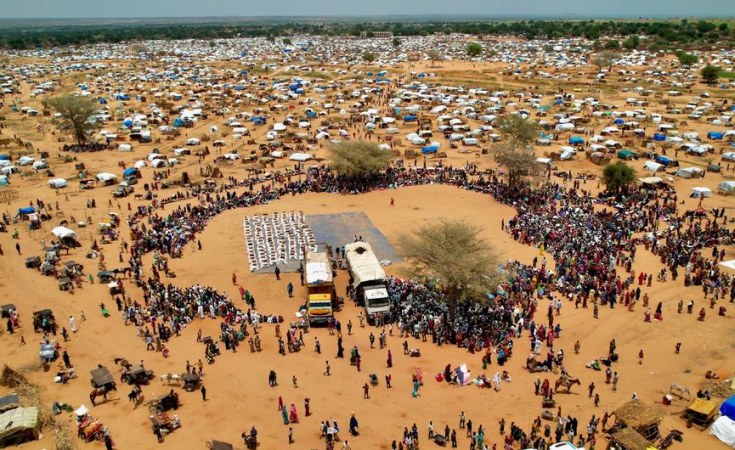The continental body should focus on coordinating and collaborating with humanitarian actors, rather than new structures and policies.
Sudan's ongoing civil war underlines not only Africa's dire humanitarian situation, but the limits of current continental responses. The International Organization for Migration estimates that five million people have been displaced and nearly 25 million Sudanese need humanitarian aid and protection.
Despite longstanding efforts to prepare for such crises, the African Union (AU) struggles to coordinate assistance and support countries in need. The dire situation also affects Somalia, the Democratic Republic of Congo, Mali and Burkina Faso.
At an open session on humanitarian action in May, the AU's Peace and Security Council (PSC) restated its commitment to facilitating humanitarian action during armed conflicts or natural disasters. Yet, the AU's limited footprint in Sudan raises questions about the continental body's ability to deliver.
When clashes erupted in Sudan, many countries wanting to evacuate their nationals struggled with difficulties at border posts. Humanitarian agencies and displaced persons also battled to get in and out of the country, and remedial measures weren't coordinated.
And although the AU was part of the 19 June international donor conference to raise funds for humanitarian relief in Sudan, it wasn't among the pledging organisations. The ministerial-level event saw the European Union, Germany, United States, Qatar and others pledge nearly US$1.5 billion for relief efforts in Sudan and affected neighbouring countries.
Humanitarian efforts are funded from the meagre 2% that states contribute to the AU Commission budget
Some experts told the ISS' PSC Report that the AU's role in easing such crises has been negligible because it hasn't activated the dedicated agency intended to drive the process. This lack of action is surprising given that Africa is an epicentre of global humanitarian emergencies. And coordinating relief efforts should be politically less contentious than other AU functions such as conflict mediation or peacekeeping.
In 2016, the AU Assembly endorsed a recommendation to establish the African Humanitarian Agency (AHA) to streamline action on the continent. This was an important step forward, but the agency still hasn't been set up. Like many other AU initiatives, it faces problems with financing, internal coordination and a lack of follow-through by member states.
In February 2023, African heads of state at last adopted the AHA's statute, but progress has since remained slow. The PSC has asked the AU Commission to expedite the agency's implementation and ensure it gets the support needed to carry out its mandate effectively.
AU member states' lack of political backing and their meagre resource allocations have been major constraints. In 2010, for example, the AU Executive Council recommended a budgetary increase for humanitarian action from 2% to 4%, given the magnitude of the need and the limited funds available. More than a decade later though, no move to increase funding has been made.
The African Humanitarian Agency is vital, but its absence shouldn't prevent the AU from taking action
Currently, continental humanitarian efforts are funded from the meagre 2% that member states contribute to the main AU Commission budget. Funds received through the AU Special Emergency Assistance Fund are also used. This poor state of affairs has increased Africa's dependence on external funding, contrary to the 'African solutions to African problems' mantra.
Although the AHA is vital for robust action, its absence shouldn't prevent the AU from taking action. In Sudan for example, the continental body could have coordinated evacuation efforts by African countries. That would have helped smaller states whose capacity shortages forced them to rely on their larger neighbours to bring their citizens to safety.
PSC Report sources reveal that evacuations through some of Sudan's neighbouring countries were accompanied by a sudden spike in the price of visas and other bureaucratic obstacles. AU coordination could have prevented these problems and would have reinforced the body's relevance among African citizens and international partners concerned about the crisis.
Given the scale of Africa's urgent humanitarian needs, creating new structures and policies isn't the solution
If the AU lacks the capacity to provide humanitarian support, partnerships with other entities can help achieve stability. In 2019, for example, the AU collaborated with the UN High Commission for Refugees and the Rwandan government to set up an emergency transit mechanism to evacuate refugees and asylum seekers from Libya. This enabled the management of an emergency, and although a short-term solution, it's a model the AU could explore for Sudan and other situations across Africa.
Given the scale and urgency of the continent's humanitarian needs, creating new structures and policies isn't the solution. Their implementation would take too long and depend on African countries' political will and readiness to respond - both of which are in short supply.
Instead, the AU should focus on effectively coordinating and collaborating with security and humanitarian actors. It should develop strategies and guidelines, boost skills and expertise where needed, and secure sustainable funding for humanitarian agencies and the PSC's emergency response work.
The AU should align the AHA with international humanitarian agencies working in Africa to prevent duplication, enhance cooperation and make the best use of the resources and expertise available in global networks.
It should also appoint a high-level political champion for humanitarian issues to secure member state support for existing measures and increase contributions to the Special Emergency Assistance Fund. The champion could also ensure that Africa's humanitarian situation receives ongoing attention.
Elizabeth Sirengo, Researcher, African Peace and Security Governance, ISS Addis Ababa
This article was first published by ISS' PSC Report.


